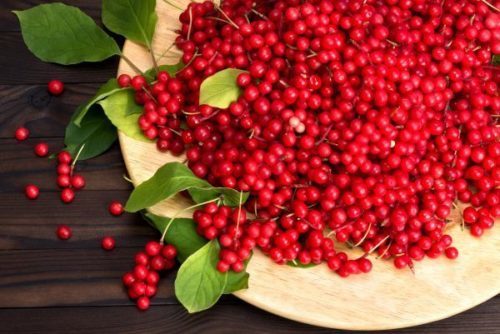
26 Aug Feeling Stressed? Stock Your Shelves With These Herbal Allies
When clients come to my practice reporting symptoms like fatigue, low sex drive, brain fog, weight gain, mood swings or trouble sleeping one of the first remedies I reach for after functional testing is the adaptogenic herbs.
Adaptogens are a class of herbs derived from plant roots, tree bark and leaves that help regulate the HPA Axis — hypothalamus, pituitary and adrenal glands — the system best known for its role in managing the body’s reaction to stress. Adaptogens counter the effects of physical and emotional stress by nourishing these organs to strengthen immunity, increase energy, improve stamina, restore hormonal balance and create vitality and health throughout the body.
Good Stress vs Not-So-Good Stress
Life is full of stress and most of it is quite normal. There’s your cousin’s wedding in Tennessee that you’re really looking forward to but can’t find the time to plan for. There’s the grass that’s now 10 inches tall and desperately in need of a trim but your lawn mower just took its last breath. There’s Back-To-School shopping with lines longer than the TSA check-in at the airport. These are all normal occurrences of adult life that require a little bit of planning and lot of patience.
The stress that we need to be mindful of — the Not-So-Good — is the kind that causes mental distress or physiological change in the body: divorce, major illness, chronic overload at work that interferes with sleep, causes weight gain, anxiety and depression. Over time, stress like this causes changes in the chemical and physical structures of the body, disrupting key functions that are important for preventing disease.
SOS: Your Body on Stress
The human body is amazing. There are literally thousands upon thousands of signals occurring every minute to help us adapt. Whether there is an actual stressor (physical) or something we perceive as stressful (mental), a cascade of hormones and neurotransmitters (brain chemicals) gets released similar to a 911 call for help. In response to these chemicals, the hypothalmus, a small almond shaped organ in your brain, sets off the first alarm by releasing a substance called CRF (Corticotropin Releasing Factor) which calls the pituitary and the adrenal glands into action. The adrenal glands then set off the second alarm which stimulates a surge of two important substances: adrenaline and cortisol.
Think of cortisol as your body’s 911 operator activating everything that’s needed to manage an emergency. Like a 911 operator who sends the police to the scene, cortisol’s chief responsibility is to get your body whatever it needs for basic survival and to shut off any functions that just aren’t necessary in the moment. Think about the things you need during an emergency and the things you don’t. You need clear eyesight, sharper focus, more oxygen to your lungs so that you can breathe and energy so that you can run or lift something heavy if you had to. These are all essential functions. The non-essential functions include things like digestion, reproductive hormone production (testosterone and estrogen) and immune system functions. Think about it: do you really need your stomach working on digestion in the middle of a dangerous situation? Probably not.
Adrenaline (also known as epineprhine) is the partner to cortisol. Similar to the ambulance and fire truck that arrive on the scene of an accident, adrenaline is there to do the heavy lifting. Adrenaline increases your heart rate, raises your blood pressure to improve circulation, increases your breathing to get more oxygen to your lungs, and widens your pupils to make more light available for your vision. Adrenaline gets your brain moving fast — hey, there’s no time for daydreaming when there’s an emergency happening! Carbohydrates (sugars) get metabolized quickly to deliver energy to the big muscles in your body such as the legs and arms for fight or flight.
Once the stressful event is over and the emergency gets cleared up, your body’s stress response system – the HPA axis – works to get hormones back in line and your blood pressure, heart rate and breathing back to a normal pace. All of your body systems, including digestion and reproductive hormone production resume their normal functions and life gets back to normal.

But repeated activation of the stress response system – the 911 operator – along with overexposure to cortisol and adrenaline can disrupt almost all of your body systems, the most important one being suppression of your all important immune and reproductive systems. Excessive cortisol can cause fat storage, changes in mood and sex drive, increased food cravings, insomnia, irregular menstrual cycles, a decline in testosterone and so much more. This is where nature’s wisdom and the trusted adaptogens come in handy.
Adaptogens: The Kings and Queens of Herbs
Many of the herbs we know as adaptogens have been in use for centuries in Traditional Chinese Medicine (TCM) and in Ayurveda, India’s traditional system of medicine. Though they work in different ways and offer unique benefits, all adaptogens serve the ultimate purpose of regulating the HPA axis to normalize hormones, boost energy, improve mood, mitigate inflammation and reduce the oxidative stress caused by free radicals. Adaptogens are true to their name: they help our bodies ‘adapt’ to the stress of modern life which often involves long work hours, traffic delays and juggling multiple roles at once. “Adaptogenic herbs increase your body’s resistance to physical, biological, emotional and environmental stressors,” writes David Winston, coauthor of Adaptogens: Herbs for Strength, Stamina and Stress Relief (Healing Arts Press, 2007).
Dosing Guidelines:
Herbs are medicine so a little may be a lot and it’s wise to consult a clinical herbalist or compounding pharmacist knowledgeable about herbs, botanical medicine and proper dosing before beginning or sampling any regimen. Consult your health care provider if you have a medical condition, are pregnant, nursing or planning to become pregnant before initiating any supplement. If you currently take prescription medications, consult your pharmacist who can identify possible interactions. For example, ashwagandha is not advised for those with an overactive thyroid and Asian Ginseng may worsen high blood pressure and those with anxiety or insomnia. A compounding pharmacist can also guide you in different formulations of herbs, such as lotions and creams, if taking herbs orally is not possible. For these reasons, recommended dosages will not be included.
The Six Pack: My Favorite Adaptogens for Optimal Health
1. Ashwagandha (Withania Somnifera)
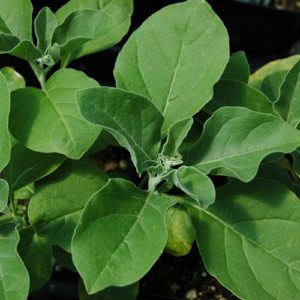
Ashwaganda – Withania Sominfera
Ashwagandha has held a central role in Ayurveda, India’s traditional system of medicine, for over 4,000 years and is one of the most common herbs still in use today. It is often prescribed for symptoms of deep mental and physical exhaustion. A small woody shrub with brilliant red berries, ashwagandha is native to the drier regions of the Mediterranean, Southern Europe, India, the Middle East and Northern Africa. In Sanskrit, the name ashwagandha literally means “the smell of a horse” which may be due to the strong, pungent scent of its fresh roots. Like a horse, this herb offers a powerful kick to the immune system and helps the body adapt to stress. Many modern herbalists compare its immune boosting properties to Panax Ginseng used in Traditional Chinese Medicine however, unlike ginseng’s stimulating quality, ashwaghanda is the soother and is often prescribed for anxiety, depression, insomnia hence it’s botanical name ‘somnifera.’ Studies have confirmed that ashwaghanda contains compounds that exhibit antioxidant, anti-inflammatory, immune stabilization and brain protection activities.
Nickname: The Soother
Use: Calming and soothing; helps relax mind and body, balances mood, improves mental focus, improves sleep, relieves anxiety and nervousness, mild pain reliever.
Properties: Immune tonic, Fertility tonic, Nervine relaxant, Antispasmodic
Availability: Tea, Capsule, Tincture, Extract
Precautions: generally safe and well tolerated but women who are pregnant should avoid ashwagandha due to its potential to stimulate the uterus. Ashwagandha may cause stimulation to the thyroid gland so it is not advised for those with overactive thyroid conditions.
2. Eleuthero (Eleutherococcus senticosus)
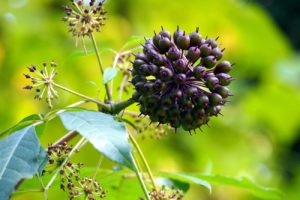
Eleuthero – Eleutherococcus senticosus
The use of Eleuthero dates back over 2000 years. A staple in Traditional Chinese Medicine (TCM) and often referred to as Siberian Ginseng, evidence has shown that eleuthero root has strong antioxidant properties which makes it a powerful immune system booster. As an adaptogen it helps promote the normal regulation of the endocrine system’s response to stressors. The active compounds in eleuthero root, eleutherosides, are believed to stimulate the pituitary-adrenocortical system allowing for more efficient regulation of the stress response and healthy levels of cortisol. Eleuthero is native to the Taiga region of the Far East (southeastern part of Russia, northern China, Korea, and Japan). In Traditional Chinese Medicine eleuthero root is used to invigorate qi energy (pronounced chi), strengthen and nourish the spleen and kidney and to balance vital energy. The root and the rhizomes (underground stem) are used medicinally. Research suggests that it may help to support feelings of well-being, reduce occasional fatigue, shorten the length of colds and flu viruses, increase stamina and improve memory and cognitive performance.
Nickname: The Enhancer
Use: Stimulating; well known for improving mental focus and alertness, increasing energy and stamina, clearing the body’s detoxification pathways, reducing mental fatigue
Properties: Immune tonic, Endurance booster
Availability: Tincture, Extract
Precautions: May be too stimulating and actually cause or worsen insomnia; women who are pregnant should consult their healthcare provider before beginning any supplement.
3. Holy Basil (Ocimum Sanctum)
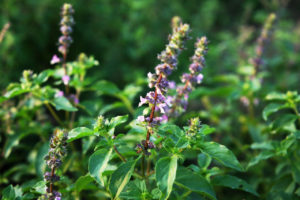
Holy Basil (Tulsi)
Holy Basil, commonly referred to as Tulasi or Tulsi, is revered in India’s Traditional Medicine and is considered on of their most important herbs. Within Ayurveda, tulsi is known as “The Incomparable One,” “Mother Medicine of Nature” and “The Queen of Herbs,” and is revered as an “elixir of life” that is without equal for both its medicinal and spiritual properties. It is native to the Indian subcontinent and widespread as a cultivated plant throughout the Southeast Asian tropics. For over 3,000 years it has been recommended for immune support due to its potent antioxidant and antiviral properties. Hundreds of in vitro animal and human experiments have been conducted to help gain insight into tulsi’s medicinal properties and evidence has shown the herb to have broad spectrum antimicrobial, antiviral, antifungal, antimalarial, antiprotozoal, antioxidant and anti-inflammatory activity making it useful for a broad range of chemical, physical, infections and emotional stressors. For metabolic stress, it has been shown to help normalize blood glucose and blood pressure and correct blood cholesterol levels. Modern herbalists often employ tulsi for issues related to the nervous and immune systems, including to support memory and as a treatment for depression and anxiety. There is also mounting evidence that the properties of tulsi can protect organs and tissues from the chemical effects of heavy metals and pollutants. Tulsi’s immune-stimulating properties also make it beneficial for environmental allergies.
Nickname: The Revitalizer
Use: Body, mind and spirit revitalization and balancing; improves mental clarity, elevates mood, relieves mental and physical fatigue, increases energy, relieves anxiety and low mood, improves mental outlook
Properties: Nervine, Immune system tonic, Antioxidant, Antiviral, Carminative (gas reliever), Diuretic, Expectorant
Availability: Often taken as a tea but also available as a tablet
4. Schisandra (Schisandra Chinensis)
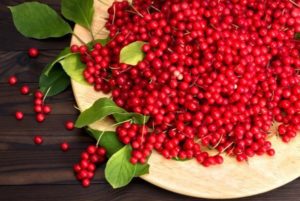
Schisandra (Schisandra Chinesis)
Legend has it that 5,000 years ago Shen Nong, the legendary emperor of China believed schisandra (pronounced shi-zan-druh) to be a plant superior to all in creation, one that held the power to cure all disease and prolong life. A woody vine with dense clusters of brilliant crimson colored berries, schisandra is native to northern China, Korea, Japan and the Russian Far East. The flavor of schisandra berries is said to capture the 5 elements of Traditional Chinese Medicine: earth (sweet), wood (sour), fire (bitter), water (salty) and metal (tart). Schisandra has been a staple in Traditional Chinese Medicine for centuries, often prescribed by herbalists to improve physical stamina, enhance libido and strengthen mental clarity. Only in the 1940s and 1950s did Schisandra gain its classification as an adaptogen, thanks to many Russian clinical studies that identified its pharmacological structure and stress-protective properties such that it could be woven into Russian conventional medicine. Modern herbalists often recommend schisandra for liver and kidney detoxification and support as well as for anxiety and mental fatigue.
Nickname: The Cleaner
Use: Detoxification, stimulant; improves mental focus, reduces anxiety, relieves physical fatigue, enhances athletic performance and endurance, primary recommendation for liver detoxification and removal of toxins and hormone disruptors; often recommended for brain fog, problems with memory or focus.
Properties: Anti-inflammatory, Detoxification
Availability: Tincture, Tea, Extract. Look for supplements that are standardized to the schisandrins which are active compounds.
Precautions: classified as a stimulant and caution advised for individuals with hypertension, diabetes and those with mental health concerns. Should also be avoided during pregnancy or while nursing.
5. Rhodiola (Rhodiola Rosea)
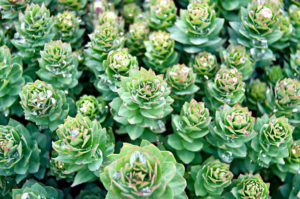
Rhodiola rosea
Like the others, Rhodiola has been used in traditional medicinal practices for centuries in China, Russia, Scandinavia and other countries worldwide. A thick-leaved sedum native in the Arctic regions of Europe (including Britain), Asia, the southern Alps in Italy and Bulgaria. In North America it can be found in Alaska and the cooler areas of eastern Canada, Maine, Vermont and Pennsylvania. Rhodiola was first identified by the first-century Greek physician Dioscorides in his medical text titled De Materia Medica. He named it rodia riza. Nearly sixteen hundred years later, Swedish botanist Carolus Linnaeus (considered the father of modern taxonomy) gave it the name Rhodiola rosea. Traditional use of this wonderful adaptogen has been to improve physical strength and stamina. However, as scientific studies increased in the 1970s, new properties of cognitive (brain) enhancement have been discovered. Modern herbalists often recommend it to help their patients combat fatigue and enhance work performance by increasing attention span and improving concentration. Despite being a relatively new herbal medicine in the U.S., its potential in mental health is very promising. A small pilot study conducted by the Department of Psychiatry at the University of California, Los Angeles found that rhodiola was effective at reducing symptoms of anxiety in patients diagnosed with generalized anxiety disorder. In animal studies it has been shown to increase levels of serotonin to alleviate symptoms of depression in patients diagnosed with mild to moderate depressive disorder. In patients with chronic fatigue syndrome, rhodiola also exerted positive effects in a double-blind study of 60 people. Rhodiola’s ‘secret sauce’ may also be that it helps to normalize cortisol levels which is elevated during periods of stress, contributing to many of the same symptoms associated with chronic fatigue syndrome and depression.
Nickname: The Regulator
Use: Stimulating; most important adaptogen for soothing nervousness, anxiety, irritability and low moods; improves focus, mental performance, physical stamina; as a mood regulator it helps reduce feelings of frustration, ‘burn out’ and mental fatigue; stimulates the immune system; boosts libido and fertility. As a stimulant it should not be taken immediately before bedtime.
Properties: Antiviral, Nervine, Immune stimulant, Heart tonic, Neuroprotectant
Precautions: usually well-tolerated but can have significant interactions with prescription antidepressants and should not be used by individuals who have bipolar depression with manic behaviors. Always consult a health care professional before using rhodiola.
6. Maca (Lepidium meyenii)
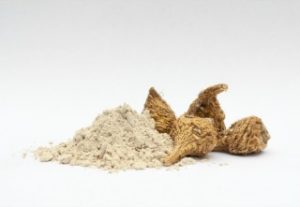
Peruvian ginseng or maca (Lepidium meyenii)
Often referred to as Peruvian Ginseng, maca is considered the ‘Mother’ of hormone balancers and nourishers. Native to the Peruvian central Andes, maca is a plant that belongs to the brassica (mustard) family and Lepidium genus. It has been cultivated for over 2000 years, first identified in 1553 by Cieza de Leon, a chronicler of the Spaniard conquest of Peru. At the time, de Leon was only able to identify that a certain root was used by natives of the region for ‘maintenance.’ Much later, in 1653, Father Bernabe Cobo a chronicler of the Spanish conquest of Peru, further identified and classified maca as a vital stimulant, nourisher and fertility-enhancer. In clinical studies of mice, maca has been shown to increase sperm count and motility. Additional studies suggest that maca may help improve learning and memory, correct menstrual irregularities, increase libido, enhance sexual function and reduce feelings of anxiety and depression. As a nutraceutical, maca is also rich in essential amino acids, magnesium, iron, iodine as well as plant sterols that are critical for hormone production and adrenal function.
Nickname: The Balancer
Use: aphrodisiac, stimulant; improves mental focus, reduces anxiety, relieves physical fatigue, enhances athletic performance and endurance, primary recommendation for liver detoxification and removal of toxins and hormone disruptors; often recommended for brain fog, problems with memory or focus.
Properties: Stimulating, Detoxifying; increases stamina and vitality; improves libido; balances male and female hormones; often recommended for menopausal and fertility concerns, low mood, anxiety.
Availability: Root (as a tea), Extract, Tablet.
Precautions: avoid during pregnancy and when breastfeeding due to insufficient clinical evidence to support safe usage.
Adaptogens are an important supplement to include in your basic health maintenance plan and especially useful as we age. As previously stated, consult your own healthcare provider before initiating any plant medicine regimen.
Want more info on how adaptogens can optimize your health?
Click HERE to schedule your Discovery Call.
Copyright, 2019, Seva Health and Seva Health Media. All rights reserved. This post is for educational purposes only and does not constitute medical advice.
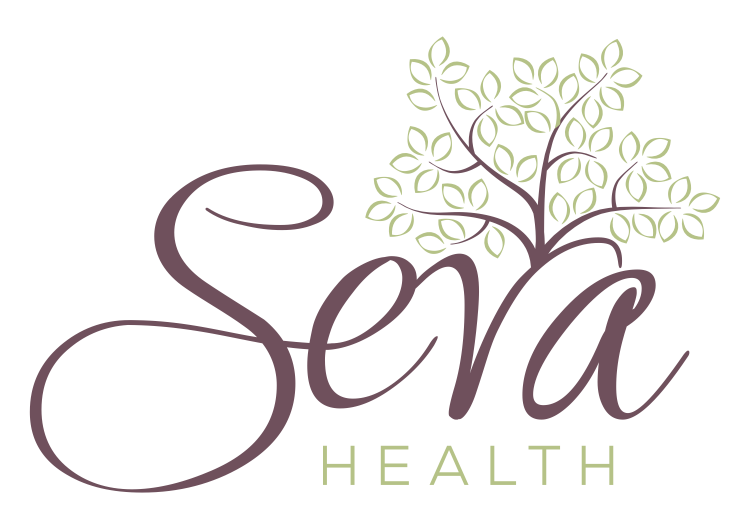
No Comments